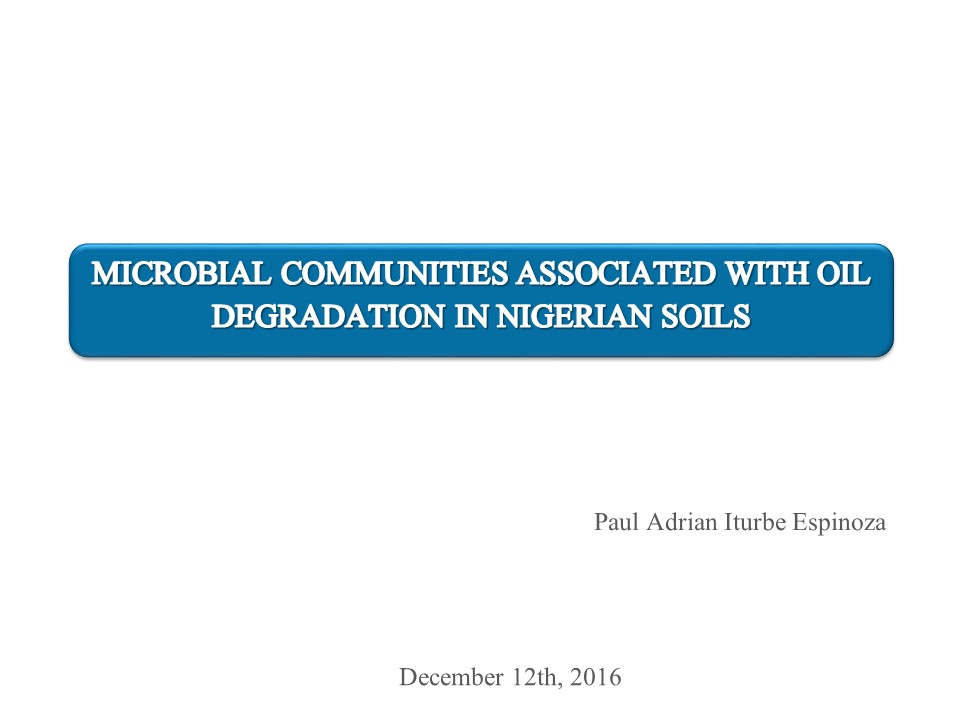Oil biodegradation - PowerPoint PPT Presentation
Title:
Oil biodegradation
Description:
MICROBIAL COMMUNITIES associated with Oil degradation in Nigerian soils – PowerPoint PPT presentation
Number of Views:2
Updated: 18 September 2022
Slides: 26
Provided by:
Username withheld or not provided
Category:
How To, Education & Training
Tags:
Title: Oil biodegradation
1
MICROBIAL COMMUNITIES associated with Oil
degradation in Nigerian soils
Paul Adrian Iturbe Espinoza
December 12th, 2016
2
Oil spills keep devastating Niger Delta
Monthly Oil Spill Incidents - 2015
http//www.bbc.com
Volume of oil spills / month (bbl)
The once-pristine Niger Delta has been polluted
for decades
http//www.shell.com.ng
3
Molecules found in crude oil
Musat, 2005
4
MAIN OBJECTIVE
Fundamental insight in microbial community
structure, function and adaptive responses during
oil degradation in contaminated soils.
Specific aim of this work
Isolation and characterization of dominant
oil-degrading strains from Nigerian soils raised
under different culture conditions.
5
METHOD
Soils and crude oil
Colony morphology and Gram Stain
Incubation and enrichment cultures
DGGE and 16S rRNA gene sequencing
Isolation of dominant strains
Cell surface hydrophobicity
Strain identifications and characterization
Crude oil biodegradability assay
6
Incubation Experiment 1
2 g of soil
47.5 mL of medium
2.5 mL of oil
pH
MEDIA
SOIL
Rich Poor
5 7
- No soil
- Soil
5 7
5 7
Incubation 30C
Rich Poor
5 7
Plating on nutrient agar
No difference between poor and rich medium pH 7
better for cell growth and oil degradation than
pH 5
7
Bioavailability of hydrocarbons in soil
Stroud et al. 2006
8
Cell Surface hydrophobicity tests Sampling of
different strains
Sampling
Sampling
9
Cell Surface hydrophobicity test
Add 2 mL of hydrocarbon
Hydrophilic cells
Hydrophobic cells
Average cells
measure OD600
vortex for 2 min
Wait 15 min
5 mL of cells (OD6001) in buffer
hydrophobicity 1 (ODafter/ODbefore)x100
Rosenberg et al, 1980
10
E. coli R7CO16Bb R7-O14Sy R7-O26Lw P7UO26So P7-O24
Lb P7CO26B P5-O26Sy P5UO15Bbc R7CO15Sy R5-O14Ly Ma
rker R7-O14Lw R7-O14Lc P5CO16G P7-O16Woc R7UO24Clw
bc P7UO26Lg SSOSw Marker R5CO24Gc P5CO16Lw R7UO16V
wc P7UO26Sw NENY SSOSy SSOLw SSOIc Marker
(PCR-DGGE) fingerprinting
11
16S rRNA gene sequencing
Purify DNA from precultures (MoBio Power Soil DNA
Isolation kit)
Primers 8f and 1512r were used to amplify almost
complete 16S rRNA gene
Sequence PCR products by using 23 ABI 3730XLs
(Macrogen)
Best hit after the BLAST search
12
E. coli R7CO16Bb R7-O14Sy R7-O26Lw P7UO26So P7-O24
Lb P7CO26B P5-O26Sy P5UO15Bbc R7CO15Sy R5-O14Ly Ma
rker R7-O14Lw R7-O14Lc P5CO16G P7-O16Woc R7UO24Clw
bc P7UO26Lg SSOSw Marker R5CO24Gc P5CO16Lw R7UO16V
wc P7UO26Sw NENY SSOSy SSOLw SSOIc Marker
(PCR-DGGE) fingerprinting
Pseudomonas aeruginosa
Rhizobium sp
Sphingobium fuliginis
13
Pseudomonas aeruginosa
16S rRNA gene sequences were identical
Gram stain
Hydrophobicity
Cont. soil
R7CO16Bb
84.68
Cont soil
P7CO26B
86,16
Uncont. Soil
P5UO15Bbc
47,94
14
R7C016Bb
P7C026B
P5U015B(bc)
Pseudomonas aeruginosa
Octane
R7C016Bb
P7C026B
P5U015B(bc)
Hexane
15
Sphingobium fuliginis
Hydrophobicity 6 h 24 h
16S rRNA gene sequences were identical
Gram stain
No soil
R7-O14Sy
83.5
53.5
Cont. soil
R7CO15Sy
55.1
89
P5CO16G
Cont. Soil
57
81.3
16
Three strains change their hydrophobicity in
stationary phase
(-) Control
() Control
89
57
45
31
19
7
17
Dominant strains isolated from different
culturing conditions
No soil
Kocuria rhizophila 94
Micrococcus yunnanensis 92
High hydrophobicity
Pannonibacter phragmitetus 71
Achromobacter xylosoxidans 43
Pseudomonas guguanensis 25
Swaminathania salitolerans 10
Sphingobium fuliginis 89
Pandoraea vervacti 7
Soil
Rhodococcus sp. 91
Patulibacter sp. 85
Pseudomonas aeruginosa 86, 47
Dyella sp. (57)
Pseudoxanthomonas sp. 48
Niabella thaonhiensis 44
Sphingopyxis soli 18
Labrys portucalensis 10
18
Bacteria in Crude Oil
100 ?L of the oil (top) layer were plated on
Nutritive agar
1 mL KPi
3 mL MES MgCl2 buffer
2.5 mL of oil
Incubation
50 mL of distilled water
19
Rhizobium sp as an example
Streak spin oil
Hydrophobicity
SSOIc
Gram stain
6.7
SSOLw
11
20
Dominant strains isolated from crude oil
After 28 days of incubation
After 1 day of incubation
Sphingobium fuliginis 84 Kocuria rhizophila
94 Micrococcus yunnanensis 92 Pannonibacter
phragmitetus 71 Swaminathania salitolerans 10
Pseudomonas guguanensis 25 Achromobacter
xylosoxidans 43 Pandoraea vervacti 7
Rhizobium (11) Ralstonia (28) Georgenia
(11) Novosphingobium (49)
All of these have a low hydrophobicity
After 28 days of incubation dominant strains are
different perhaps as a result of an adaptive
response of the community to changing conditions
21
Plating on nutrient agar
2 mL from the previous culture
47.5 mL of medium
2.5 mL of oil
MSM oil
28 days
MSM oil Ramnolipid
Enrichment 1
Enrichment 2
18/10/16
29/04/2016
27/05/2016
22
Dominant strains isolated from crude oil soil
Sphingobium fuliginis 89
1 month
Incubation 1
Rhodococcus sp. 91
Patulibacter sp. 85
5 months
Enrichment 2
Pseudoxanthomonas sp. 48
Ochrobactrum sp.
Pseudomonas sp. Achromobacter
denitrificans Ochrobactrum intermedium
Labrys portucalensis 10
Dyella sp. (57)
Niabella thaonhiensis 44
Sphingopyxis soli 18
Achromobacter animicus
Pseudomonas aeruginosa
. Achromobacter animicus
Ochrobactrum anthropi Leifsonia
shinshuensis
Bacillus sp
Ochrobactrum haematophilum
Achromobacter sp. Achromobacter xylosoxidans
Enrichment 2 Rhamnolipid
5 months
Enrichment 1
6 months
23
CONCLUSIONS
- Sphingobium fuligilis probably originates from
the oil. All 3 isolates are identical and their
dominant presence might be due to their
adaptation to the culture conditions. - Pseudomonas aeruginosa and Dyella sp probably are
dominant hydrocarbon degraders in the early and
later process of hydrocarbon degradation. - Rhamnolipids enhance the proliferation of the
genus Achromobacter. - Pseudomonas aeruginosa is a dominant specie in
all the different point of sampling.
24
Contamination problems?
Bradyrhizobium sp.
25
Acknowledgment
- Rob van Spanning - Martin Braster - Herwig
Bachmann - David Brown - Juami van Gils -
Madalina Maria Vita































